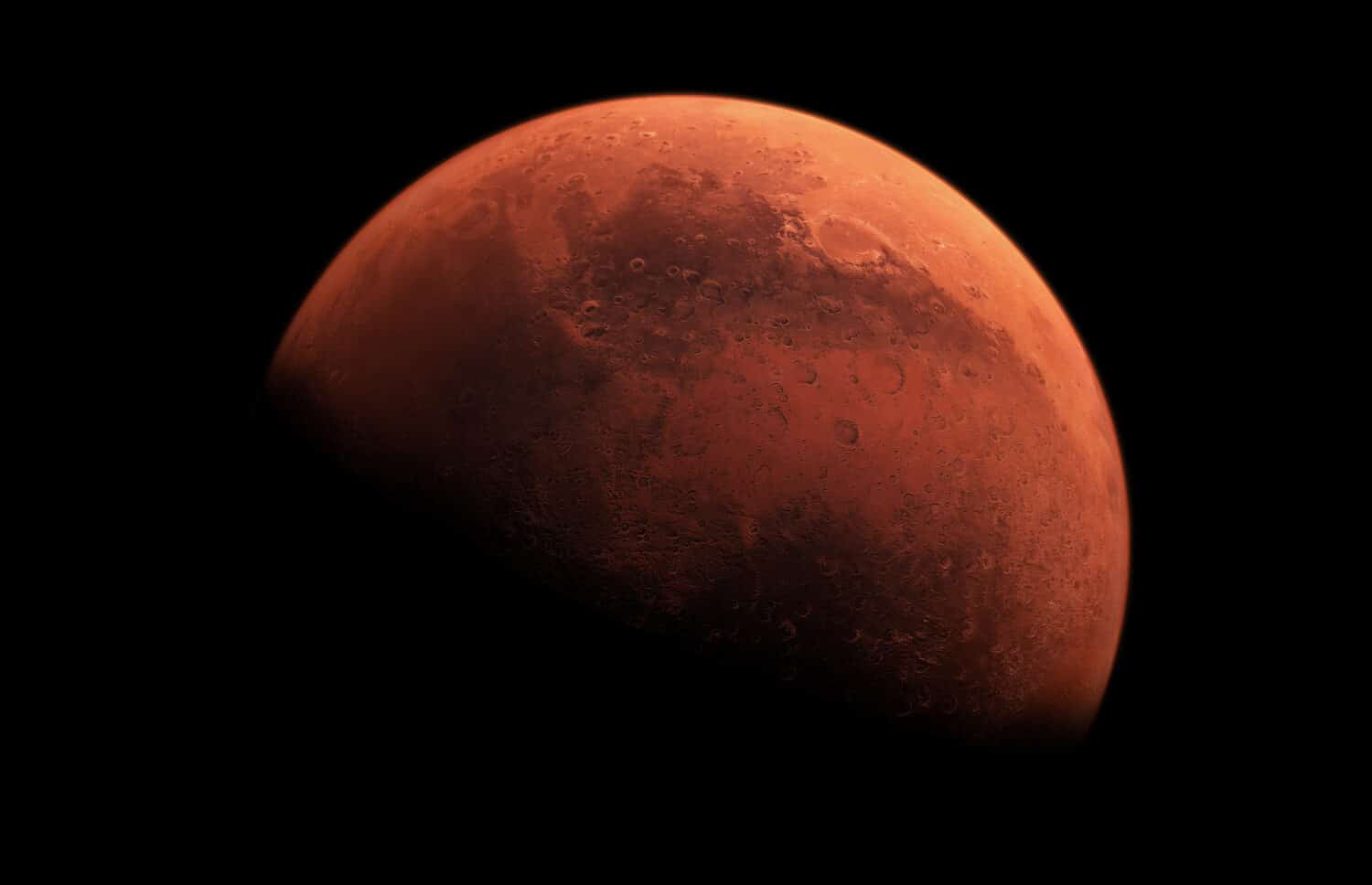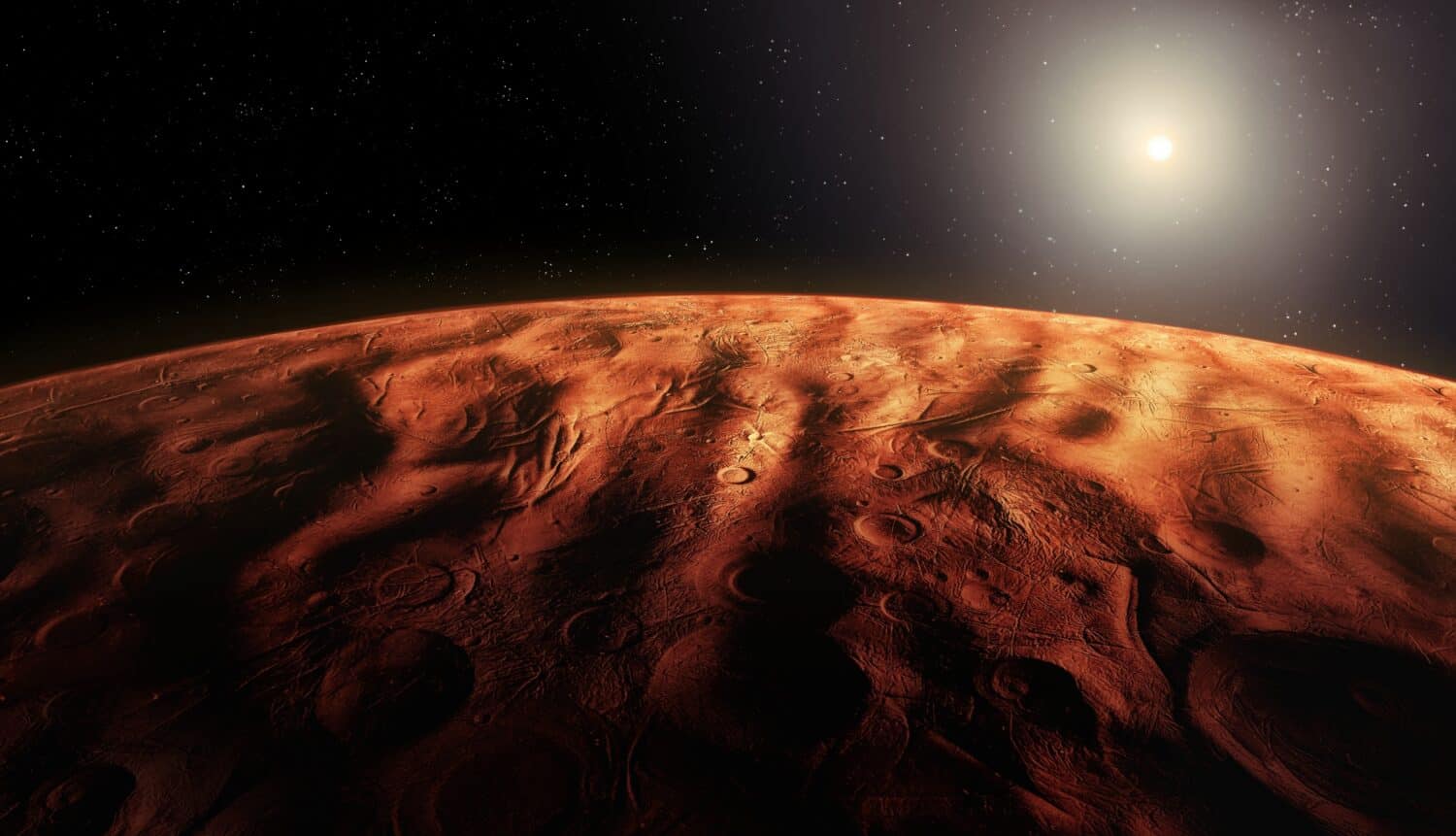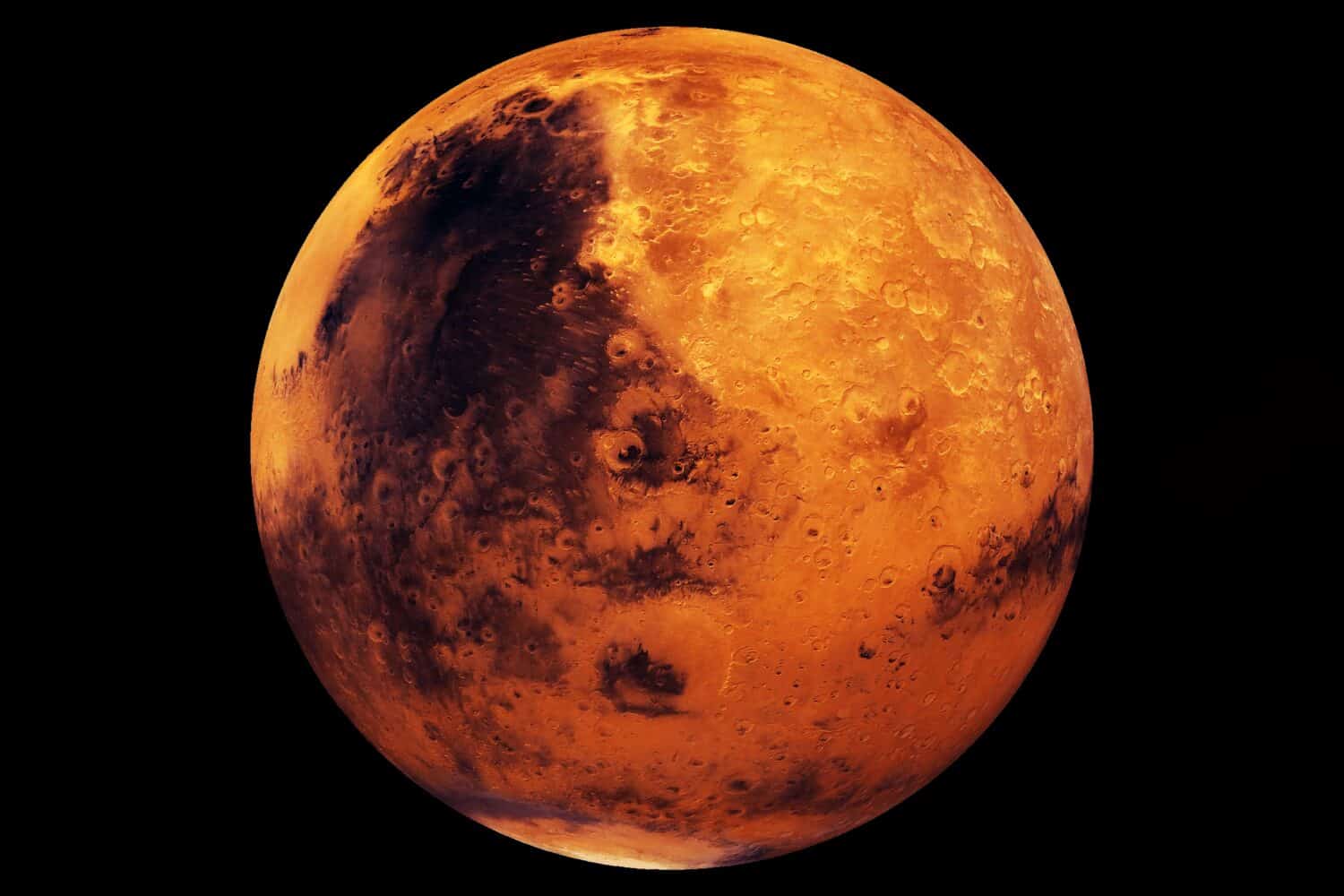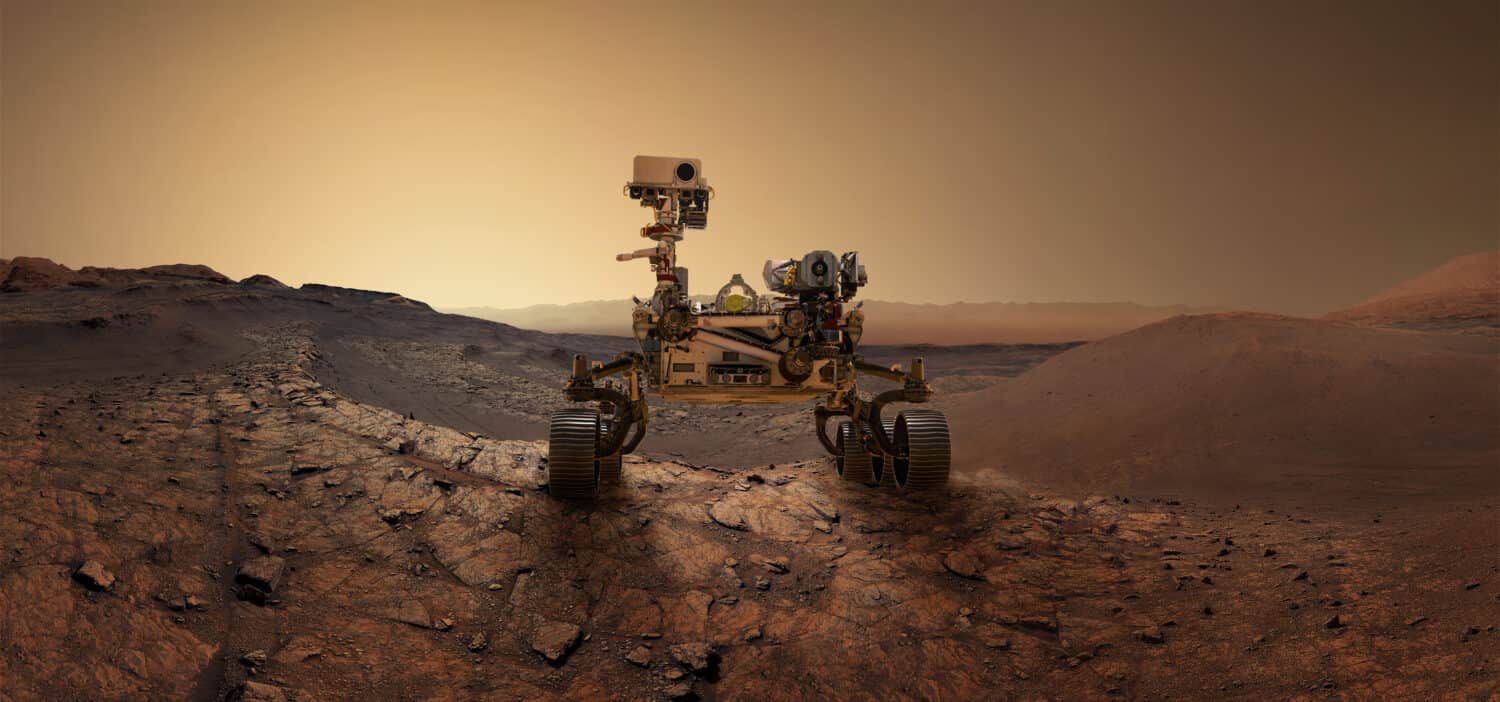Mars, also known as the Red Planet, has been one of the most well-known planets in our solar system since humans could stargaze. But how did Mars get its name when its presence has been noted and documented by many different civilizations?
As we look at the origin and meaning behind Mars’s name, we will uncover the long history of Mars as far back as records provide.

Mars, the Red Planet, has had many names across thousands of years of records.
©WR Studios/Shutterstock.com
When Was Mars First Discovered?
If you’ve ever gazed up at the night sky, you’ve probably spotted Mars, that glowing red dot among the stars. Humans have been noticing this fiery celestial body for many millennia. The fascinating journey of Mars discovery spans across time and civilizations, each adding its unique lore and beliefs to the narrative of this beautiful planet.
There Is No Exact Time in History or a Single Discoverer
Mars was never technically ‘discovered’ in the same sense that distant planets like Uranus or Neptune were. It has been visible to the naked eye since prehistoric times, owing to its proximity to Earth and its distinct reddish hue. Therefore, its existence is embedded deeply in the records of early human observations and mythology.
Our oldest recorded observations of Mars come from ancient Egyptian astronomers around 1534 BC. The Egyptians were also avid astronomers known for their monumental architectural feats and a rich pantheon of gods. Their sophisticated understanding of the cosmos enabled them to identify Mars, acknowledging it as a notable entity in the night sky.
The Babylonians flourished around the 2nd millennium BC. Much like their Egyptian counterparts, the Babylonians demonstrated an impressive understanding of the cosmos. Their diligent sky-gazing resulted in recognizing Mars as a unique celestial body.
Moreover, the ancient Greeks received the baton of celestial observation. In the 4th century BC, the Greeks, renowned for their philosophical and scientific prowess, identified Mars. This accomplishment once again marked the recognition of the red planet.
From the Greeks, the trail leads us to the Romans in the 1st century BC. The Romans were adept astronomers, their observations and deductions forming an essential part of our collective astronomical knowledge. They identified Mars, reaffirming its presence in the night sky.
The ancient Chinese were making strides in astronomy. During the Zhou Dynasty (1046-256 BC), Chinese astronomers were able to identify Mars. Their recognition of Mars adds another layer to the global understanding of the cosmos.
At about the same time, another civilization, the Indians, recognized Mars. Around the 5th century AD, Indian astronomers identified the red planet, adding another perspective to its understanding.

The ancient Egyptians have some of the oldest known records of Mars observations.
©Nazarii_Neshcherenskyi/Shutterstock.com
What Was Mars Originally Named?
The planet known as Mars today has adorned a vibrant palette of names throughout the ages. As civilizations evolved and turned their gaze towards the cosmos, each stamped Mars with a unique moniker, each name brimming with a fascinating melange of cultural insights, belief systems, and symbolic interpretations.
We’ve discovered which prominent civilization began exploring the presence of Mars as seen from our earthly skies. But how did Mars get its name from each of these civilizations? Let’s find out!
The Egyptians and Babylonians
The ancient Egyptians dubbed Mars “Horus of the Horizon.” Horus, often depicted as a falcon, was a sky god in the Egyptian pantheon, symbolizing the king or the pharaoh. The Egyptians’ choice to associate Mars with Horus suggests their view of the planet as a celestial manifestation of their royalty, a testament to its standout brilliance in the night sky.
Now the Babylonians, whose knowledge of astronomy was remarkably advanced, labeled Mars “Nergal,” their god of war and the ruler of the underworld. This dual symbolism underscores how the Babylonians saw Mars as a celestial object of fascination and a potential omen of fear, emphasizing their intricate understanding of the cosmos.
The Greeks and Romans
From there, the intellectual torch of Mars’s naming journey passed to the hands of the ancient Greeks. Observing its intense crimson hue, they christened the planet Ares after their god of war. The Greeks were well-known for their fascination with the cosmos and its mysterious symphony. In their understanding, the universe was a cosmic stage where their deities played out their divine drama. With its sanguine tones, the planet was a perfect embodiment of Ares, the deity representing the violence and tumult of warfare.
When the Romans took the helm from the Greeks, they translated the planet’s name to Mars, which, as stated previously, is the Roman equivalent of Ares. However, the Roman Mars was a more sophisticated figure than the Greek Ares, representing not just warfare but also agriculture and fertility. In Roman culture, Mars became a symbol of duality, reflecting their close ties to the paradoxical domains of warfare and farming, destruction, and nurturing.
The Chinese and Indians
Ancient Chinese astronomers, journeying through their celestial contemplations, christened Mars the “Fire Star.” Chinese philosophy frequently assigned elements to celestial bodies, and Mars, with its fiery red hue, naturally received association with the element of fire. According to Chinese cosmology, the Fire Star was a harbinger of chaos and destruction, echoing their worldview’s ever-repeating cycle of creation and destruction.
Parallel to the narrative unfolding in the West and East, the Indian subcontinent etched its influence on Mars. The planet was known as “Mangala,” as per the ancient text Surya Siddhanta. Similar to the Greeks and Romans, Indians linked Mars with war. Adding their cultural twist, they associated Mars with the weekday Tuesday, infusing mundane earthly time with a touch of celestial sparkle.
The Symbolism of Mars Over the Years
Today, in the modern scientific era, Mars retains its Roman name. But the meaning behind ‘Mars’ has evolved from its roots in ancient mythology. Today, ‘Mars’ symbolizes a world of scientific intrigue. The next frontier for human exploration, and perhaps, the future dwelling place for humanity. This name will undoubtedly collect new connotations and meanings as we continue our cosmic journey.
Moreover, tracing the history of Mars’s names takes us on a grand journey. One that is similar to traveling through a cosmic gallery displaying the cultural evolution of human civilizations. From the Egyptian association of Mars with royalty to the Roman duality of war and agriculture, from the Chinese philosophy’s elemental symbolization to the Indian and Babylonian personification of war and fear, the names given to Mars weave a rich tapestry of our collective cultural and scientific heritage. Each name, each civilization, has added another dimension of complexity and intrigue to our understanding of the Red Planet.
A Modern Influence
Yet, the narrative is far from over. As humanity marches forward, our relationship with Mars continues to evolve. Mars has become a physical destination within our reach, no longer merely a celestial object imbued with mythological connotations. The planet now embodies our thirst for exploration, scientific curiosity, and ambition to become a multi-planetary species. The name ‘Mars’ resonates with the potential for discovering alien life. In addition to understanding the evolution of the Solar System. And even realizing the dream of establishing human colonies on another planet.
Furthermore, the multitude of names for Mars reflects the progression of our knowledge and cultural contexts. From “Horus of the Horizon,” “Ares,” “Mars,” “Fire Star,” “Mangala,” to “Nergal,” each designation illuminates the beliefs and the astronomical understanding of a specific civilization at a particular time. The evolution of these names tells the captivating tale of humanity’s timeless fascination with the cosmos. As well as our ceaseless urge to decipher the mysterious world beyond our Earthly confines.
Finally, the planet’s name carries a dual symbolism as we stand on the brink of potential human missions to Mars. It’s a nod to our mythological past and a beacon illuminating the exciting path of our scientific future. Today, Mars whispers tales of ancient deities and cosmic wars. Yet, it also roars with the promise of new chapters waiting to be penned in the annals of human history.

The planet Mars represents assertion, initiative, action, and determination in astrology.
©Soonios Pro/Shutterstock.com
Mars and Astrology
As we step onto the grand stage of astrology, each celestial body plays a unique role. Each embodies particular energies and symbolic resonances. Among them, Mars holds a specific spot. Its vibrancy exudes a distinctive aura that influences many astrological interpretations. Known for its fiery persona and radiant presence, Mars symbolizes raw dynamism and courage in the realm of astrology.
Moreover, beliefs across many ancient civilizations share similarities with astrology today. And influence our understanding of Mars. From the Babylonians associating Mars with Nergal, the god of war, to the Greeks naming it after their war god, Ares, these societies have shaped the image of Mars as a symbol of action, energy, and conflict. These historic interpretations tie into the astrological viewpoint of Mars as a planet of assertive and dynamic energy.
The Facets of Astrology
In astrology, Mars resonates with the energies of initiative, action, and determination. It is known as the cosmic spark that ignites our ambition and fuels our drive to push boundaries. Associated with assertiveness and warrior-like vigor, Mars governs the primal instincts that spur us to tackle challenges head-on. The fiery energy of Mars is what incites us to venture into uncharted territories and assert our desires.
Additionally, in an astrological chart, Mars indicates how we assert ourselves in the world. It’s our cosmic compass that points towards how we pursue our desires and defend our territories. The location of Mars in an individual’s astrological chart can offer invaluable insights into their enthusiasm, bravery, sexual energy, and competitive spirit.
Mars also reigns over the signs of Aries and Scorpio. Aries, the first sign of the zodiac, is imbued with the pioneering energy and fearless drive of Mars. It’s a sign that’s always ready to take the lead and charge forward. On the other hand, Mars shares a co-rulership with Pluto over Scorpio. Lending it an intensity, depth, and transformative power that echoes Mars’ raw, passionate energy.
In the context of astrological aspects, Mars plays a critical role too. When Mars forms a harmonious aspect with another planet, it infuses the energy of that planet with initiative, courage, and drive. However, when Mars is involved in a challenging aspect, it can indicate conflict, impulsiveness, or rash actions.
Furthermore, from an astrological viewpoint, Mars is a symbol of assertive energy and courage. Its dynamic narrative intertwines historical symbolism with modern interpretations. Today, Mars continues to inspire as a symbol of bravery and determination. Underpinning the fiery spirit of human endeavor across the ages.

In multiple ancient civilizations, Mars was often referred to as the planet of war.
©Artsiom P/Shutterstock.com
Mars Is a Source of Inspiration
Mars, the mesmerizing Red Planet, has been a source of inspiration for humankind for many centuries. Its enigmatic presence in the night sky has stirred our curiosity. As well as stoked our imagination and fueled our ambition to explore the universe. In the modern era, the role of Mars has evolved significantly. It transcends the realms of astronomy and astrology and penetrates numerous aspects of human life.
Since time immemorial, Mars has captivated our ancestors with its mysterious red glow. Today, this fascination has evolved into rigorous scientific inquiry. Mars is an intriguing subject for scientists, who scrutinize its surface features, atmosphere, and potential for harboring life. The scientific community’s renewed interest in Mars was piqued when studies revealed the possible presence of liquid water on the planet’s surface known as recurring slope lineae. Moreover, the Mars Rover missions’ detection of organic molecules has intensified discussions on potential life on Mars. Mars continues to inspire scientific curiosity and exploration, encouraging us to delve deeper into its enigmatic nature.
Space Exploration
Moreover, in space exploration, Mars has gone from being a distant celestial object to a real and tangible destination for space missions. The technological advancements of the 21st century have brought Mars within our reach. NASA, the European Space Agency (ESA), and private companies like SpaceX are pioneering these efforts. All launched numerous missions aimed at understanding and, eventually, colonizing Mars. Elon Musk’s ambitious vision of a self-sustaining city on Mars by 2050 exemplifies how Mars inspires us to push the boundaries of what’s possible. The successful landing of the Perseverance rover and the flight of Ingenuity, the Mars Helicopter, is a testament to these incredible strides in space exploration.
Finally, from instigating scientific inquiry and space exploration to stimulating creative narratives and personal introspection, Mars has been integral to our journey through time. This fascinating planet, which has been inspiring humankind since we could stargaze, continues to do so in novel and exciting ways. As we continue to unravel the mysteries of Mars, we’re not just learning about a distant planet. We’re also learning more about ourselves and our place in the cosmos.

Mars is one of the few planets being explored for colonization.
©Triff/Shutterstock.com
Conclusion
Mars has been a part of human knowledge for millennia. As one of the five planets visible to the naked eye, its presence has been noted since antiquity. Therefore, the exact moment of its ‘discovery’ is hard to pin down because it predates written history. What we know is that various ancient cultures, each with their distinct cosmological viewpoints, recognized this bright celestial body and ascribed its symbolic significance.
Mars Was Justly Named
In addition, it is from these ancient interpretations that Mars got its name. The Romans, renowned for their martial prowess and vast empire, named the planet after Mars, their god of war. The planet’s reddish hue, reminiscent of the color of blood, was fitting for the deity associated with warfare and courage. This association was not unique to the Romans, either. The Greeks, too, associated the planet with their war god, Ares. Similar correlations existed in other ancient cultures, like the Mesopotamians. Who named the planet Nergal after their god of war and plague.
Fast-forward to the present day, the name Mars has been carried through the centuries. And it remains the internationally accepted term for the fourth planet from the Sun. Its ancient namesake continues to color our understanding of the planet, both scientifically, culturally, and symbolically.
To conclude, Mars’s discovery and naming are integral parts of human history and our evolving understanding of the universe. They highlight our innate curiosity and our need to make sense of the world around us. And while we’ve come a long way from those ancient times, our fascination with Mars endures in the modern era. Ongoing scientific discoveries and future space exploration prospects fuel us.
Thank you for reading! Have some feedback for us? Contact the AZ Animals editorial team.







